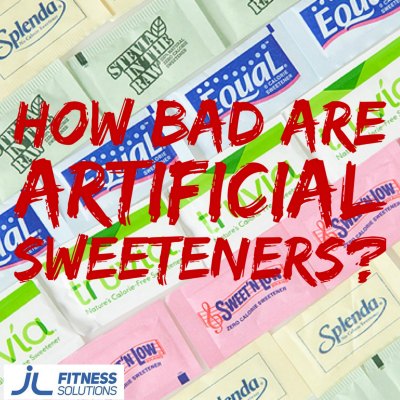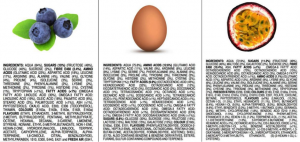Artificial Sweeteners – How bad are they?
Artificial Sweeteners – How bad are they?
You may have heard the myth “artificial sweeteners are worse than sugar. They are bad for your health, will make you fat and cause type 2 diabetes!”, or words to that effect.
In this short article, we will examine if there is any truth behind these claims, or not.
The theory that consuming foods/drinks containing artificial sweeteners are unhealthy, or will have a negative impact on heath, largely originated from studies carried out on animals in the USA, as far back as the 80s, and the conspiracy theories developed from there.
More recent observational studies have shown that regular use of low Kcal sweeteners is associated with high BMI. However, as I have explained in previous posts, correlation doesn’t necessarily equal causation, asking the question “did the sweeteners actually cause the high BMI or do people with high BMI choose to drink more artificially sweetened drinks?”. The theory behind the latter is supported by further research showing that, when caloric sweeteners (i.e. sugar) are replaced with low-caloric sweeteners (i.e. aspartame, saccharin etc.), it lead to a significant decrease in BMI, fat mass and waist circumference, due to the decrease in overall calories being taken in.1 This suggests that the use of artificially sweetened beverages may be beneficial to assist in weight loss during a diet, as they enable a lower calorie diet to be adhered to, without compromising palatability (taste). 2
Renwick & Molinary 2010 concluded that there is no consistent evidence suggesting low-energy sweeteners increase appetite or subsequent food intake, cause insulin release or affect blood pressure in normal subjects. Thus, the data from extensive in vivo studies, in human subjects, show that low-energy sweeteners do not have any of the adverse effects predicted by in vitro, in situ or knockout studies in animals.3 This suggests that, once again, artificial sweeteners do not have the negative impact that many have suggested, specifically when we actually look at examples of research observed in human test subjects, as opposed to animal models.
Another, often touted, reason why not to use products containing artificial sweeteners, is that you ‘shouldn’t put all of those chemicals in your body’. Given the information above, that there isn’t strong enough evidence for the ‘negative effects’ of sweeteners, the argument doesn’t stand up to scrutiny.
Take aspartame, for example, (chemical name: N-(L-α-Aspartyl)-L-phenylalanine, 1-methyl ester) seeing these long names on packages often worries consumers. However, if we break anything down in to its chemical components, it will appear equally as daunting. Take the below graphic of a; blueberry, egg or passion fruit. For example, look at all the E-numbers and ‘chemicals’ that are naturally present:
Fig 1. 4
N.B. Animal studies can often be an indicator of how a compound may react in people, meaning they should not be taken as a given that “it happened in this animal, therefore, it will be the same in humans”. This is due to significant differences in how each animal metabolises the compound once it has been ingested, similar to how chocolate is fine for humans but poisonous to dogs. It’s wise to check, when you read articles making claims, whether or not the studies they have referenced are in humans or animals.
In Conclusion:
For aiding weight loss, replacing caloric foods/drinks with low calorie sweetener alternatives is beneficial, as they can help to reduce the calorie content of the diet and enable a calorie deficit to be maintained. There is, currently, no concrete evidence to suggest artificial sweeteners have negative health consequences.
If you have any questions, or would like more information on this topic, please contact me via one of the methods below:
E-mail: info@jlfitnesssolutions.co.uk
Instagram: jamesleept
Facebook: JL Fitness Solutions
Twitter: james_leept
Website: www.jlfitnesssolutions.co.uk
References:
- Miller and Perez 2014 https://www.ncbi.nlm.nih.gov/pmc/articles/PMC4135487/
- J Nutr. 2012 Jun; 142(6): 1155S–1162S, Foreyt, Kelinman et al 2012 https://www.ncbi.nlm.nih.gov/pmc/articles/PMC4135487/
- Renwick and Molinary 2010https://www.ncbi.nlm.nih.gov/pubmed/20619074
- Fig 1. https://jameskennedymonash.wordpress.com/2013/12/12/ingredients-of-an-all-natural-banana/




No Comments